Startups developing a 3D fitting algorithm for online shoppers, metal foams for cooling and filtration applications, mechanical watches made of tomorrow, aerosol-based analysis of Carbon Black, and a digitalized nurse call each win CHF 10,000
30.08.2022
Alter Ego, Apheros, FemtoG, Meteore Watches, and Paton win Venture Kick's first stage of financial and entrepreneurial support. Their projects aim to reduce the return rate for online-bought apparel, provide metal foams for cooling and filtration applications, apply state-of-the-art aerosol technology to characterize the primary structure of Carbon Black, Silica, and other dispersed materials, create the mechanical watches of tomorrow, and take a new approach to communication between caregivers and patients.
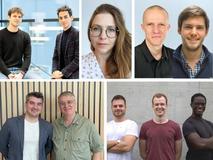 |
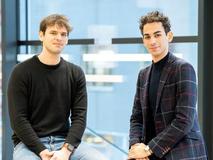 Alter Ego: Pietro Zullo and Fayçal M'hamdi
|
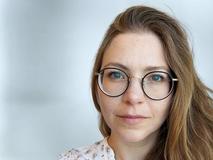 Apheros: Julia Carpenter
|
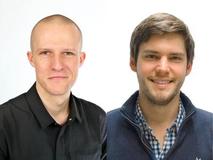 FemtoG: CEO Franz Friebel and CTO Jörg Wieder
|
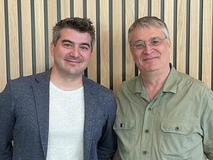 Meteore Watches: Frédéric Loizeau and Francis Cardot
|
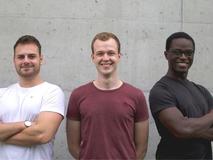 Paton: Frensi Zejnullahu, Raphael Schnyder, and Jeremiah Agboola
|
Alter Ego: a 3D fitting algorithm for online shoppers
While buying clothes online, most customers are uncertain about the size that would fit them. Hence, 30% of the ordered articles are returned, and handling these operations costs up to 50% of a company’s revenue. Half of these returns are reported to be due to size fitting issues and 10% of the articles are damaged during the process and then burned. This implies a paradoxical situation, where retailers have to keep the return process free and easy in order to encourage shopping but they economically suffer from high return rates and cause huge environmental damage.
Alter ego aims to reduce the return rate for online-bought apparel. The team consists of Fayçal M'hamdi and Pietro Zullo. Fayçal is currently studying computer science for a master's at ETHZ and Pietro is studying robotics at ETHZ for his master's thesis. Their technology can extract any body measurement and reconstruct a 3D avatar from anyone 1 picture and height. They are currently developing a size recommendation tool and a 3D fitting algorithm to allow shoppers to get size recommendations and virtually try clothes in order to not return their purchases. In the short term, their value comes from the impact induced by reducing article returns and support to semi-tailored and push&pull production. In the long term, their user base will be broad enough to use globalized data to adapt production for specific areas/brands, therefore, reducing waste. The garment market, specifically for online retails, was worth about USD 500 billion in 2020 and is expected to triple in the next 10 years.
The first funding from Venture Kick will be used to speed up their technological development by outsourcing some of the tasks for the website development, and back-end optimization, but also be used for legal support such as IP protection, and incorporation strategy fees.
Apheros: metal foams for cooling and filtration applications
Cooling has a huge environmental impact. By 2030, an estimated 10 % of global energy will be used to cool electronics. The market for cooling solutions is correspondingly large. For heat sinks alone, the market size is about USD 6.5 billion with a CAGR of 7.4 %.
Apheros provides metal foams for cooling and filtration applications. Dr. Julia Carpenter from the Complex Materials Group at ETH Zurich is the main driver behind the company. She is the co-inventor of the manufacturing method and understands the technology well. Apheros have a patent-pending, easily scalable manufacturing route for steel, copper, and nickel foams. Their foams have a unique microstructure that sets them apart from all currently available metal foams and makes them ideal for applications in cooling and filtration. Their first product is a stainless steel heat sink which is optimal for passive cooling applications where it significantly outperforms current solutions both in terms of cooling performance as well as ecological impact due to their low-waste production method.
The Venture Kick funds will be used to buy the equipment for scale-up and for the salaries of interns.
FemtoG: Aerosol-based analysis of Carbon Black
Existing analytical methods do not characterize Carbon Black and Silica fully and do not apply to recycled Carbon Black (rCB). To enhance product quality and to allow rCB to become a commodity, a new analytical tool is required. In addition, Carbon Black producers require inline monitoring of their production process to reduce their off-spec production (up to 10%).
FemtoG applies state-of-the-art aerosol technology to characterize the primary structure of Carbon Black, Silica, and other dispersed materials. The founding team consists of Franz Friebel and Jörg Wieder who both obtained their PhDs in aerosol science at ETH Zurich. They combine several commercially available devices to extract sample material from reactors and to precondition the aerosol flow. This includes the removal of water and organics from the gas phase and three consecutive particle deagglomeration nozzles. The characterization of preconditioned samples is conducted with a separate particle size and particle mass analyzers. The innovative step of the FemtoG approach is to characterize powder materials by a single particle analysis and not by bulk methods. They offer a material analysis service including consulting. They sell standardized Instruments and maintenance packages. They offer material producers customized solutions for real-time and inline product quality monitoring. The lab analysis service has a market potential of CHF 250k per year based on five customers and one sample per week. The global
production of Carbon Black is 20 mio t per year. Increasing the production efficiency by 1% due to improved process monitoring opens a market of USD 200 mio per year.
With the Venture Kick grant, they want to first validate the value of MVP for customers, then establish FemtoG as a brand and as an analysis tool and finally add the functionality of a high-time resolution to the MVP. femtog.com
Meteore Watches: mechanical watches made of tomorrow
Spectacular mechanical timepieces are the innovation backbone of Swiss watchmaking, with some of them being composed of more than 400 mechanical components that make them alive. With so many parts needed in their assembly, such watches are often complex, imposing, and ultimately out of reach for most watch lovers, costing well above CHF 50’000. This becomes even more critical as luxury watches' target audience becomes younger and less acquainted with mechanical watches.
Meteore proposes a new paradigm in watch complications to create unique mechanical functions with no added complexity, no added bulkiness, and low opex/capex needs. Their “Cadrans à Complications” replace complex mechanisms made from hundreds of components with one single part as thin as a sheet of paper. By combining advanced technologies from the space and semiconductor industries, Meteore brings mechanical watchmaking into the 21st century.
The team is composed of Frédéric Loizeau and Francis Cardot. Francis is the inventor of the technology at the core of the company. He holds 18 patents and has been active in key fields of watch technologies for the past 35 years. Frédéric is an expert in silicon technology and has moved to business- and customer-related roles for the past five years, with a clear focus on the watch industry.
The Swiss luxury watch retail market was estimated at CHF 51.9 billion in 2018, where 80% of the market is dominated by 20 brands. That still leaves CHF 10.4 billion to share between connoisseurs and niche brands. Meteore will use the first stage funding to mature its prototypes and kickstart its marketing efforts. www.meteorewatches.com
Paton: innovative patient bell call system
Due to the unspecific alert of today's nurse calls hospital staff can't anticipate the patient's needs beforehand. This results in idle time because nurses and other ward members have to go and ask the patient what he/she needs. Further, the patient's needs and the qualifications of the attending nurse usually don't line up resulting in inefficient use of resources. This usually means that overqualified personnel provides care better done by someone more fitting.
Paton is developing a digitalized nurse call that takes a new approach to communication between caregivers and patients. It was founded in 2021 by three students: Frensi Zejnullahu, Raphael Schnyder, who both graduated from the ZHAW in July, and Jeremiah Agboola that share the need to relieve the healthcare system, especially hospitals. Paton will allow for ideal matchmaking between the requests and staff, making sure that no request is misplaced. This will reduce idle time in a high-performance work environment, build a foundation for a more efficient workflow, and allow for better usage of resources. Since every ward and hospital work in its own way, they want to offer this nurse call on a license-based business model with optional add-ons. This way, hospitals get a perfectly tailored system without a large upfront investment. The market size is estimated at 1.2 billion USD globally
They will use the Venture Kick funding for software development, and equipment such as devices, servers, and more. www.paton.ch
While buying clothes online, most customers are uncertain about the size that would fit them. Hence, 30% of the ordered articles are returned, and handling these operations costs up to 50% of a company’s revenue. Half of these returns are reported to be due to size fitting issues and 10% of the articles are damaged during the process and then burned. This implies a paradoxical situation, where retailers have to keep the return process free and easy in order to encourage shopping but they economically suffer from high return rates and cause huge environmental damage.
Alter ego aims to reduce the return rate for online-bought apparel. The team consists of Fayçal M'hamdi and Pietro Zullo. Fayçal is currently studying computer science for a master's at ETHZ and Pietro is studying robotics at ETHZ for his master's thesis. Their technology can extract any body measurement and reconstruct a 3D avatar from anyone 1 picture and height. They are currently developing a size recommendation tool and a 3D fitting algorithm to allow shoppers to get size recommendations and virtually try clothes in order to not return their purchases. In the short term, their value comes from the impact induced by reducing article returns and support to semi-tailored and push&pull production. In the long term, their user base will be broad enough to use globalized data to adapt production for specific areas/brands, therefore, reducing waste. The garment market, specifically for online retails, was worth about USD 500 billion in 2020 and is expected to triple in the next 10 years.
The first funding from Venture Kick will be used to speed up their technological development by outsourcing some of the tasks for the website development, and back-end optimization, but also be used for legal support such as IP protection, and incorporation strategy fees.
Apheros: metal foams for cooling and filtration applications
Cooling has a huge environmental impact. By 2030, an estimated 10 % of global energy will be used to cool electronics. The market for cooling solutions is correspondingly large. For heat sinks alone, the market size is about USD 6.5 billion with a CAGR of 7.4 %.
Apheros provides metal foams for cooling and filtration applications. Dr. Julia Carpenter from the Complex Materials Group at ETH Zurich is the main driver behind the company. She is the co-inventor of the manufacturing method and understands the technology well. Apheros have a patent-pending, easily scalable manufacturing route for steel, copper, and nickel foams. Their foams have a unique microstructure that sets them apart from all currently available metal foams and makes them ideal for applications in cooling and filtration. Their first product is a stainless steel heat sink which is optimal for passive cooling applications where it significantly outperforms current solutions both in terms of cooling performance as well as ecological impact due to their low-waste production method.
The Venture Kick funds will be used to buy the equipment for scale-up and for the salaries of interns.
FemtoG: Aerosol-based analysis of Carbon Black
Existing analytical methods do not characterize Carbon Black and Silica fully and do not apply to recycled Carbon Black (rCB). To enhance product quality and to allow rCB to become a commodity, a new analytical tool is required. In addition, Carbon Black producers require inline monitoring of their production process to reduce their off-spec production (up to 10%).
FemtoG applies state-of-the-art aerosol technology to characterize the primary structure of Carbon Black, Silica, and other dispersed materials. The founding team consists of Franz Friebel and Jörg Wieder who both obtained their PhDs in aerosol science at ETH Zurich. They combine several commercially available devices to extract sample material from reactors and to precondition the aerosol flow. This includes the removal of water and organics from the gas phase and three consecutive particle deagglomeration nozzles. The characterization of preconditioned samples is conducted with a separate particle size and particle mass analyzers. The innovative step of the FemtoG approach is to characterize powder materials by a single particle analysis and not by bulk methods. They offer a material analysis service including consulting. They sell standardized Instruments and maintenance packages. They offer material producers customized solutions for real-time and inline product quality monitoring. The lab analysis service has a market potential of CHF 250k per year based on five customers and one sample per week. The global
production of Carbon Black is 20 mio t per year. Increasing the production efficiency by 1% due to improved process monitoring opens a market of USD 200 mio per year.
With the Venture Kick grant, they want to first validate the value of MVP for customers, then establish FemtoG as a brand and as an analysis tool and finally add the functionality of a high-time resolution to the MVP. femtog.com
Meteore Watches: mechanical watches made of tomorrow
Spectacular mechanical timepieces are the innovation backbone of Swiss watchmaking, with some of them being composed of more than 400 mechanical components that make them alive. With so many parts needed in their assembly, such watches are often complex, imposing, and ultimately out of reach for most watch lovers, costing well above CHF 50’000. This becomes even more critical as luxury watches' target audience becomes younger and less acquainted with mechanical watches.
Meteore proposes a new paradigm in watch complications to create unique mechanical functions with no added complexity, no added bulkiness, and low opex/capex needs. Their “Cadrans à Complications” replace complex mechanisms made from hundreds of components with one single part as thin as a sheet of paper. By combining advanced technologies from the space and semiconductor industries, Meteore brings mechanical watchmaking into the 21st century.
The team is composed of Frédéric Loizeau and Francis Cardot. Francis is the inventor of the technology at the core of the company. He holds 18 patents and has been active in key fields of watch technologies for the past 35 years. Frédéric is an expert in silicon technology and has moved to business- and customer-related roles for the past five years, with a clear focus on the watch industry.
The Swiss luxury watch retail market was estimated at CHF 51.9 billion in 2018, where 80% of the market is dominated by 20 brands. That still leaves CHF 10.4 billion to share between connoisseurs and niche brands. Meteore will use the first stage funding to mature its prototypes and kickstart its marketing efforts. www.meteorewatches.com
Paton: innovative patient bell call system
Due to the unspecific alert of today's nurse calls hospital staff can't anticipate the patient's needs beforehand. This results in idle time because nurses and other ward members have to go and ask the patient what he/she needs. Further, the patient's needs and the qualifications of the attending nurse usually don't line up resulting in inefficient use of resources. This usually means that overqualified personnel provides care better done by someone more fitting.
Paton is developing a digitalized nurse call that takes a new approach to communication between caregivers and patients. It was founded in 2021 by three students: Frensi Zejnullahu, Raphael Schnyder, who both graduated from the ZHAW in July, and Jeremiah Agboola that share the need to relieve the healthcare system, especially hospitals. Paton will allow for ideal matchmaking between the requests and staff, making sure that no request is misplaced. This will reduce idle time in a high-performance work environment, build a foundation for a more efficient workflow, and allow for better usage of resources. Since every ward and hospital work in its own way, they want to offer this nurse call on a license-based business model with optional add-ons. This way, hospitals get a perfectly tailored system without a large upfront investment. The market size is estimated at 1.2 billion USD globally
They will use the Venture Kick funding for software development, and equipment such as devices, servers, and more. www.paton.ch


